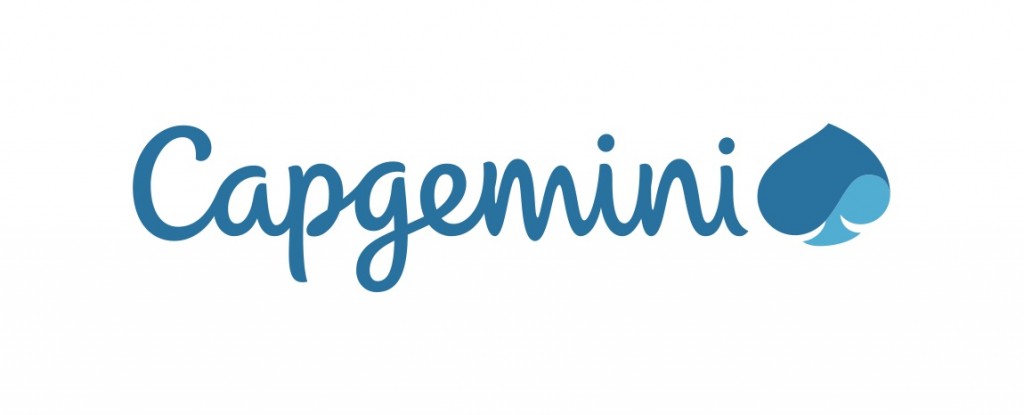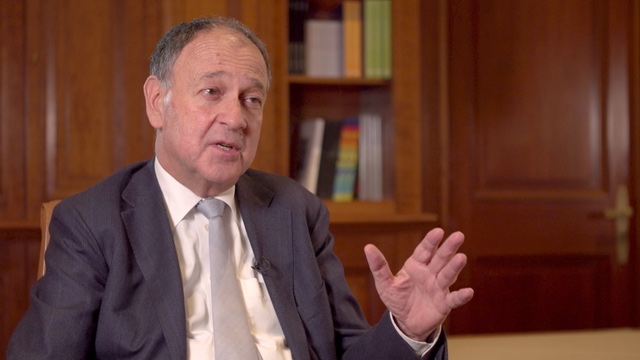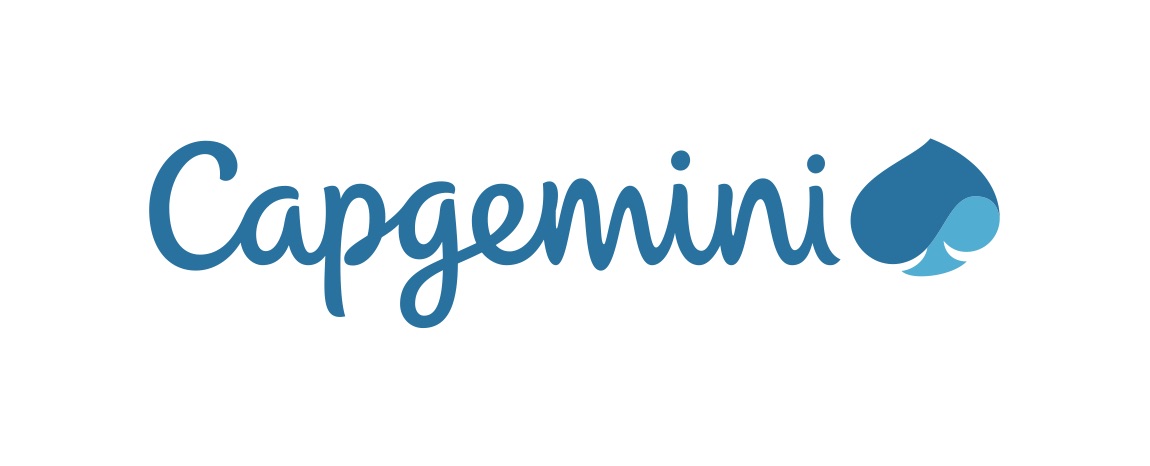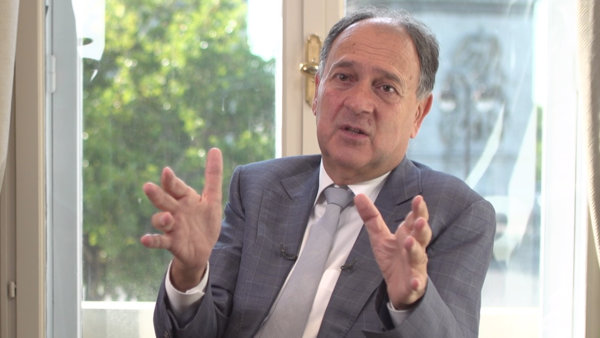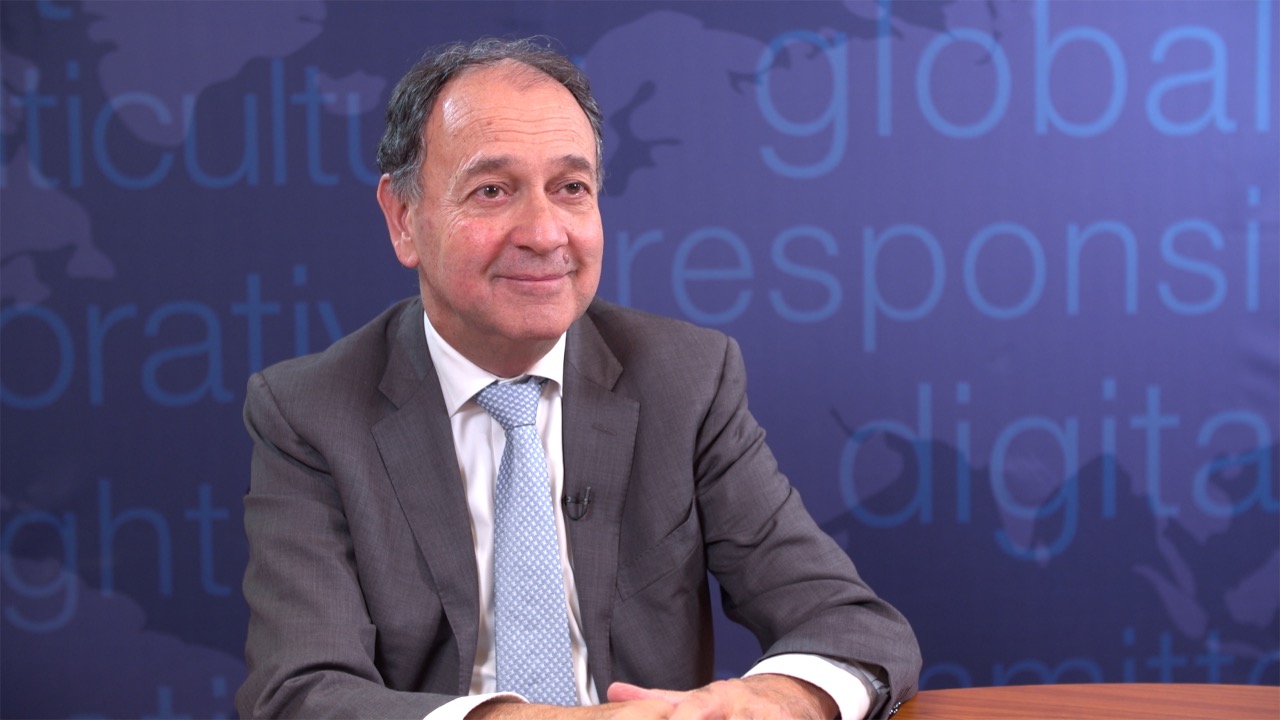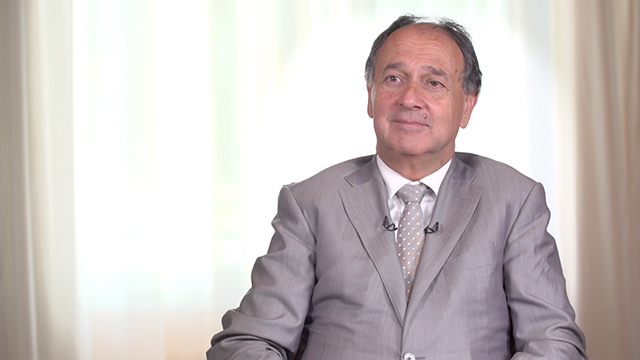EuroBusiness Media (EBM): Capgemini, a global leader in consulting, technology and outsourcing services, reports results for the first-half of 2012. Paul Hermelin welcome, you are the CEO of Capgemini. What are your comments on your first-half results and how do they sit with regard to your guidance for the full year?
Paul Hermelin: Actually, the surprise is there are no surprises. We held all our commitments, we grew as we expected to grow, we developed our margin, we developed the net result and cash, absolutely in line. So what does that mean? It means that the demand has stayed relatively stable in spite of all economic uncertainty in the eurozone. All results are not the same, there are markets that are stronger than others, but I would just say a total revenue growth above 8%, actually organic growth is 2.3%. 2.3% is in line with our initial forecast of slight growth over the year – and by the way we raised it a little bit with prudence, because we see at least stability in the second-half – so the market is relatively stable. So it means actually that there is a good demand, and there are uncertainties. And our customers are eager to invest, and they are prudent, so they don’t commit their group to long standing projects. But I would just say, results in line – satisfactory results for a company that proves more and more resilient.
EBM: So, given what you’ve just said, what is your guidance for the full-year?
Paul Hermelin: We adjusted a little bit our full-year guidance. What we had said was: first, we said we were going to grow this year. Based on the first-half momentum, we now say we are going to grow more than 1% organic and it could be even a little better. So some confidence on the top line. On margins, we had said: margin progression. Our margin last year was 7.2%. We now say that we are comfortable with the consensus at 7.55%, so a kind of safe commitment on 7.6%. And on free cash flow generation, we maintain our initial guidance, which is €300 million of free cash flow – subject to any accident that would trigger restructuring or something, but €300 million of free cash flow is our objective for the year.
EBM: What is your overview of the situation in your different regions?
Paul Hermelin: The first point is, I think Capgemini has something rather unique, which is our US exposure. The United States and North America are now our third region, but they are really at par with France. And if you project in the second-half, notably helped by the surge of the US dollar versus the euro, North America will become the first region. And in North America we grew close to 10% for six months, so it’s a region of very solid demand. Besides that, we recorded double digit growth in the Nordics, so the north of Europe is still going well. And if you put aside our long-standing contract with Revenue & Customs in the UK, we grew double digit in the UK too. So that’s pretty strong. Germany is positive too. And then we go to the south of Europe. France is slightly declining, that’s shown with an erosion in the second- quarter, but the second quarter was marked by Easter and more holidays and vacation, so we are just slightly negative. And then less good figures in Italy and Iberia – Spain and Portugal. And not to forget emerging countries, we grew close to 20% in Asia. No growth in Brazil in the first-half, because all our energy was to sign that gigantic Caixa deal, but the Caixa deal by itself will fuel a growth in the range of 20% very soon.
EBM: What are your views on the current macro-economic uncertainty, and the impact that it may have on your business?
Paul Hermelin: The concern is mainly on Europe. The US people feel quite safe. Some slowdown, but still growing in Asia and Brazil. So everybody is focused on Europe, and mainly on Southern Europe. But I would just say that we feel a strong appetite, resilient appetite for investment and a little bit of prudence. But our pipeline is good, our bookings have shown a positive book-to-bill in H1, and in the pipeline we have a record number of large opportunities. So on the one hand, we read the newspapers, we read the news, we see all the vigilance. But today our market seems to resist pretty well.
EBM: Pricing remained good in the first-quarter, but what of the second-quarter? And what is your outlook on pricing in the second-half of this year?
Paul Hermelin: We reported for the third consecutive quarter a very small price erosion, less than one percentage point. What does that mean? It means that some of our units managed to raise their prices, some others are just retreating, but by one or two points, generally one point. So it’s a world of small price erosion. What does it mean actually? It means that when we shift the portfolio, we are able to find offerings where we can sell with better price resistance in an environment where prices are negative.
EBM: What is your update on your progress in Brazil, in particular the large contract with Caixa that you mentioned earlier? How is this deal going to structure your growth and your margins in Brazil going forward?
Paul Hermelin: First point is, Caixa has committed to spend minimum €100 million per year with CPM Braxis, our company there. €100 million by itself is a growth of more than 20%. So that’s a massive order intake that we closed at the end of June. I must confess, that has proven a little bit of a distraction in H1 and all sales efforts were there. And we will reap all the benefits in the second-half and mainly in the fourth-quarter. What I notably would remind everybody about this is that Caixa has wished to become a shareholder of that company at the level of 22%. It entered at a value that is above the value that we used to close our deal, so we even recorded a small capital gain two years after the company had been valued by Caixa experts at a higher price than the price we paid to take the control of CPM Braxis. And we will no longer have to finance the exit of minority shareholders since Caixa will stay, so this is very good news. A cash injection close to €50 million, less money to reimburse minority shareholders, and a long-standing shareholder that will buy more and more from us.
EBM: What is your update on your offshore development? We are under the impression that you are recently re-investing in offshore, especially in Germany, where the situation just one year ago wasn't so good? So is it the right timing to be doing so now?
Paul Hermelin: Three things. When you listen to the Indian pure players, the feeling is that in the traditional market growth has now slowed down, in the US or in the UK. Second point, all energy is to now crack the continental European market, and we too recorded some incredible success with the IKEA deal we signed in 2011 in Sweden and this year with deals we signed like E.ON Energy or Bayer Business Services in Germany. So that demonstrates that Western Europe, and notably the Northern countries of Western Europe, are opening up to Indian offshoring services. All experts expect now a doubling of the number of Indian IT specialists that will service the Western European customers. And we want to take our share of that. So in the horizon of 3 years, we may well double our number of colleagues in India. We are today at 37,000 and we want to pass over 70,000 people in India, with a big jump notably in Europe.
EBM: Could you give us an update on the recruitment and turnover in the current environment?
Paul Hermelin: The first point is that the total headcount of the group has grown a little bit, from 119,000 people to close to 121,000, so that’s a small increase, with another move forward in India, so that’s still growing and we have recruited 15,000 new people. We put a big focus on “freshers”, new graduates or very junior people. The proportion of freshers in the first-half was close to 40%, and that’s quite remarkable because there are no people released by the universities, so it’s more difficult to recruit young graduates in the first-half than the second-half. And attrition has been a little bit lower, notably in consulting, where attrition has been lowered by 4 percentage points. So the level of resignation is lower, but still relatively normal at 17%, which is a sign of a normal labour market. So we can retain talent but there is still a vibrant movement of attrition that’s pretty healthy.
EBM: Is the cash situation of the group today a matter for concern or is everything comfortable?
Paul Hermelin: Some people would remember that last June we ended with a negative position which raised concern. We end the first-half of this year with positive cash at + €27 million, where normal seasonality should have led us to a negative figure in the range of - €100 million. So that’s pretty good. And it’s all the better when you look at the detail and you see that working capital requirements have been reduced, the number of days outstanding for our customers has been reduced, and that we paid pretty well our suppliers. So, on all fronts, I must admit this is an excellent semester of cash collection, which leaves the group in a pretty healthy financial situation.
EBM: Lastly, what are you going to be your priorities for the second-half of the year?
Paul Hermelin: First point, we want to secure our commitments: show revenue stability and hopefully growth, deliver the margin improvement, confirm the free cash flow generation. Beyond that, I want us to confirm the power of our bets for top line so that we mitigate price erosion by advanced offerings that are accretive to the group. And we’re going to invest further on cloud services, on mobility and the new big wave which everybody calls ‘Big Data’. So that’s a big investment. Then, because of the cash collection that is good, we will resume a prudent journey of small acquisitions. And acquisitions will help us to move our mix even further towards added value and advanced innovation. And last, we will still manage our cost base – because that’s the base for margin progression – and put the group on the right trajectory for 2013.
EBM: Paul Hermelin, CEO of Capgemini, thank you very much.
Paul Hermelin: Thank you Adrian

